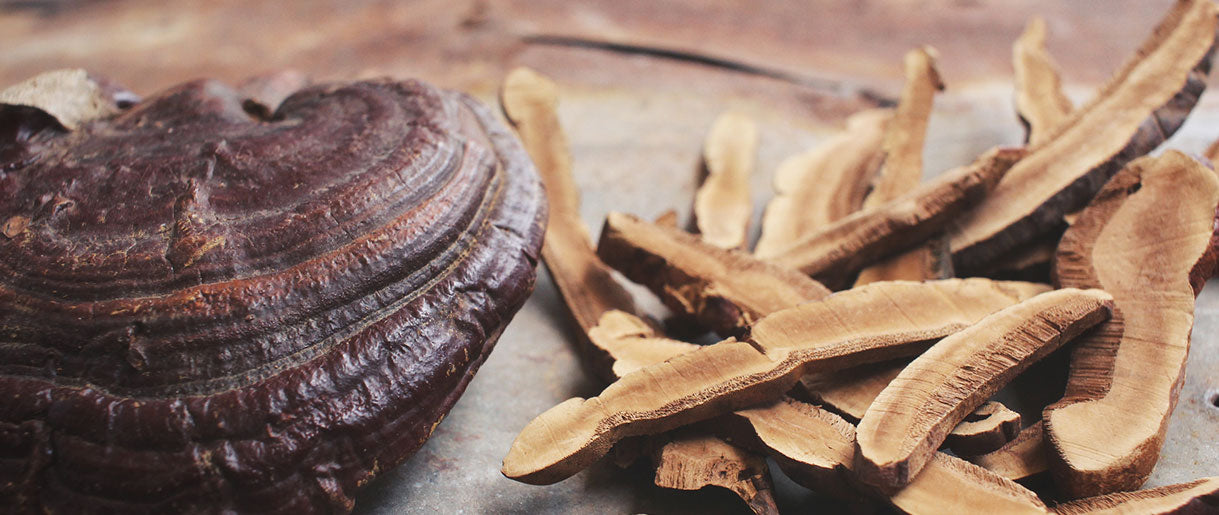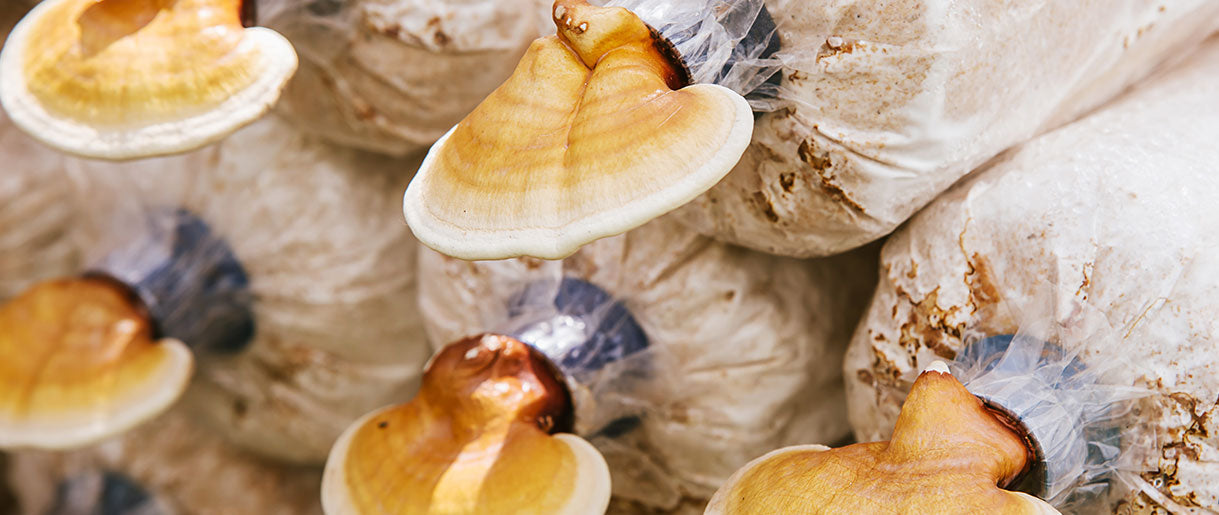Reishi mushrooms, often used in traditional Chinese medicine, have a distinct flavor profile that can be described as woody and bitter. Unlike the mild flavors of more common mushroom varieties such as button or portobello, the taste of Reishi is intensely earthy and slightly bitter. However, some people also detect a hint of sweetness underneath the bitterness.
Factors such as growing conditions and preparation methods can influence their taste. While the taste may be intense for some, Reishi mushrooms are often consumed for their purported health benefits rather than flavor. Therefore, they are frequently used in teas, soups, or as extracts to dilute their strong taste.
Despite its unique flavor, Reishi has found its way into the kitchens of many health-conscious individuals worldwide. Known as the "Mushroom of Immortality," this fascinating fungi brings a blend of wellness benefits and culinary potential that is hard to ignore.
In this article, we'll explore the taste of Reishi, the factors influencing their taste, and how they're utilized in various cuisines. We'll also share tips and tricks to make these unique mushrooms palatable and enjoyable for your taste buds. Moreover, we will share the process of creatively adding Reishi mushrooms to food so you can enjoy their benefits while keeping your meal tasty.
Unearthing the Flavors of Reishi Mushrooms

The Singular Taste of Reishi
When first encountering the Reishi mushroom, often referred to by its scientific name, Ganoderma Lucidum, one may be struck by its unique aesthetics. However, beyond its physical appeal, the distinctive Reishi mushroom taste truly sets it apart in the realm of functional mushroom species.
The Reishi mushroom taste is characteristically woody and robust, with a pronounced bitter taste that lingers on the palate. This earthy bitterness is quite unlike the mild flavors of most culinary mushrooms.
Consequently, it can surprise those used to the savory deliciousness of popular varieties like button or portobello mushrooms. You might even find a whisper of sweetness hidden beneath the initial bitterness, adding to the complexity of the Reishi mushrooms taste.
Comparing Reishi to Other Mushroom Varieties
Compared to the taste of other mushrooms, for instance, the Lion's Mane, which is appreciated for its seafood-like flavor, the Reishi takes the taste experience to an entirely different level.
Lion's Mane and other culinary mushrooms often incorporate seamlessly into different cuisines due to their versatile flavors. However, Reishi mushrooms taste so distinct that they usually stand out in the dishes it features, rather than just blending in with other ingredients.
Unraveling Factors Influencing Reishi Mushroom Taste
As the most functional mushroom species, the intense flavor of Reishi can be attributed to its rich composition of bioactive compounds, which also account for its medicinal properties. Therefore, the earthy taste is more pronounced in Reishi mushrooms grown in natural, wild conditions, where they absorb nutrients from tree bark and wood.
This contrasts with some commercially grown varieties that may have a slightly milder flavor. Also, the taste of the Ganoderma Lucidum varies depending on its age. Younger Reishi tends to have a less intense bitterness, whereas mature ones have a more concentrated flavor profile.
Reishi in the Culinary World
In the culinary world, the bitter taste of Reishi is often viewed as a challenge to be embraced, an opportunity to create dishes that balance this medicinal mushroom's robust bitterness with complementing flavors.
Understanding what Reishi mushrooms taste like is integral to fully appreciating this unique fungus, from its medicinal mushroom benefits to its potential in the culinary scene. Whether consumed as a tea, used as a cooking ingredient, or taken as a supplement, the Reishi mushroom taste is indeed an acquired one, and its earthy bitterness is a testament to the natural power packed within this medicinal marvel.
The Role of Reishi Mushroom in Different Cuisines

Reishi's Role in Asian Cuisine: A Traditional Staple
In Asian cuisine, particularly in China, Japan, and Korea, Reishi has been revered as a medicinal marvel for centuries. A common way of consuming this functional mushroom is by brewing a Reishi mushroom tea, which is believed to offer various health benefits.
It is traditionally simmered for several hours to extract its beneficial compounds into the tea fully. The resulting beverage carries the unique taste of the Reishi, with its earthy bitterness being a prominent flavor note.
In some Asian cultures, Reishi mushroom powder, derived from drying and grinding the mushroom, is another popular way of adding Reishi to food. It's versatile and can be incorporated into a range of recipes. You'll often find mushroom powder used in soups, broths, and sauces, subtly infusing them with Reishi's medicinal benefits without overwhelming the dish's overall taste.
Reishi in Western Cuisine: A Healthful Addition
Reishi is primarily used as a health supplement in the Western culinary landscape. Therefore, Reishi mushroom supplement products, often in Reishi extract or capsules, are commonly consumed for their purported health benefits. However, as Western palates become more adventurous and awareness about the benefits of medicinal mushrooms grows, eating Reishi mushrooms in their whole form or as a mushroom powder is gaining traction.
For instance, you might find Reishi mushroom powder used as an ingredient in smoothies, energy bars, and baked goods.This innovative approach to using Reishi offers a more palatable way to enjoy this functional mushroom's unique taste, given that the flavors of other ingredients can balance it out.
Exploring Unique Recipes with Reishi Mushroom

Reishi's distinctive, somewhat bitter flavor can be a culinary challenge. However, with the proper cooking method and ingredients, it can transform into the most delicious mushroom dish you've ever tasted.
One exciting way to incorporate Reishi into your diet is through a Reishi mushroom tea recipe. By adding sweet elements like honey, cinnamon, or vanilla to your Reishi tea, you can balance the bitterness and create a beverage that not only taste good but is also brimming with health benefits.
Fresh Reishi, although less commonly available than Reishi powder or supplements, can also be used in various dishes. For example, when added to a hearty stew or slow-cooked soup, the robust, earthy flavor of the fresh Reishi contributes to a deep, complex taste profile that is quite unlike any other.
Remember, the key to adding Reishi to any dish is balance. Once you learn how to offset the unique taste of this medicinal mushroom, a whole new world of culinary possibilities opens up.
Addressing the Reishi Mushroom Taste: Tips and Tricks

Preparing Reishi Mushrooms: Softening the Bitter Bite
Preparing Reishi in a way that reduces their bitter taste is a great starting point for those new to this functional mushroom. One popular method involves soaking dried Reishi, whether in whole or mushroom powder form, in hot water. This process helps soften the intense bitterness and makes it more palatable.
A longer cooking time can also help mellow the bitter taste. For example, simmer the mushrooms for at least two hours when brewing Reishi tea or making soup. This slow extraction allows the full range of flavors to develop, making the taste more complex and less harshly bitter.
Enhancing Reishi Taste: The Art of Combinations
Another trick to navigating the bitter taste of Reishi is combining them with other ingredients that can either counteract or complement their robust flavor. For example, adding sweet elements like honey or agave nectar can help balance the bitterness in a Reishi tea or a Reishi dish.
If using Reishi in powdered form, consider blending it into a smoothie with fruits like bananas or berries, which can effectively mask the bitterness. Spices like ginger cloves can also complement the earthy flavor of Reishi, enhancing their taste profile in a savory dish.
Another innovative combination is to mix the mushroom powder into your daily cup of hot cocoa. The richness of the hot chocolate and the creaminess of almond milk can work wonders in softening Reishi's intense flavor, giving you a functional food beverage that's both delicious and beneficial.
Reishi Mushroom in Beverages: A Healthy Elixir

Reishi Mushroom Tea: A Soothing, Beneficial Brew
Reishi mushroom tea is one of the most common ways to consume this functional mushroom, allowing you to reap the many benefits of Reishi while enjoying a warm, soothing beverage. The Reishi mushroom benefits are vast, ranging from bolstering the immune system to potentially exerting cancer-fighting properties.
Rich in bioactive ingredients such as beta-glucans, Reishi tea has been linked to an increase in the activity of white blood cells, which play a critical role in the immune response. This makes it a possible beneficial supplement for cancer patients and those with weakened immune systems.
Reishi offers diabetes benefits, with properties that could help manage blood sugar levels and high blood pressure, thereby offering superfood benefits that could help ward off heart disease. Furthermore, Reishi reduces anxiety and promotes restful sleep, so some people prefer to sip Reishi tea before bedtime.
Preparing Reishi tea is quite simple. Start by simmering Reishi mushrooms or powder in water for about 2 hours, then strain and enjoy. The resulting tea has an earthy, somewhat bitter taste, characteristic of what Reishi mushrooms taste like. Add a sweetener or spice like cinnamon or ginger to make it palatable.
Beyond Tea: Other Reishi-Infused Beverages
While tea is a popular choice, it's certainly not the only way to enjoy the medicinal benefits of this functional mushroom. From smoothies to lattes, you can try plenty of other Reishi-infused beverages.
Reishi mushroom coffee is a popular beverage for its potential health benefits. The bitterness of coffee complements the taste of Reishi, making for a strong drink. Add a teaspoon of powdered Reishi to your coffee and stir well.
Similarly, a Reishi smoothie can be a great way to start your day. Blend your favorite fruits, add a spoonful of Reishi powder, a bit of milk, or yogurt, and you have a delicious, nutrient-packed smoothie.
Reishi hot cocoa is another excellent beverage, especially for those not fans of the mushroom's earthy flavor. Mix Reishi powder with cocoa powder, a sweetener, and hot milk to create a comforting, beneficial drink.
The Evolution of Reishi Mushroom Taste: Supplements and Extracts

Reishi Mushroom Supplements and Extracts: A Concentrated Form of Goodness
Reishi mushroom supplements and extracts have become a popular choice for people seeking to enjoy the benefits of this functional mushroom without its inherent bitter taste.
These functional mushroom products are created by extracting the beneficial compounds from the mushroom, often as a water or alcohol extract. This process results in a potent product that delivers scientifically proven Reishi benefits, such as boosting immunity, potentially combating cancer cells, regulating blood sugar levels, and acting as a sleep aid.
Supplements come in several forms, including capsules, tablets, and tinctures, which can be easily added to a daily health regimen. On the other hand, Reishi extracts are usually available in liquid or powder form and can enhance the nutritional profile of various foods and beverages.
Taste Comparison: Raw Reishi vs. Supplements and Extracts
Regarding taste, Reishi supplements and extracts are generally milder than raw mushrooms.The extraction process, whether done with water or alcohol, can somewhat reduce the earthy bitterness characteristic of Reishi.
Reishi supplements, particularly capsules, and tablets, virtually eliminate the taste issue. The consumer doesn't experience the mushroom's natural flavor as they are usually taken with water.
On the other hand, Reishi extracts, particularly the powdered variety, still hint at the mushroom's flavor, although significantly toned down. This makes them a viable option for those who wish to enjoy the benefits of Reishi without its full-on earthy bitterness.
Choosing Supplements and Extracts Over Raw Reishi
While choosing between Reishi supplements and extracts over raw Reishi is personal, a few factors might influence this choice. Reishi supplements will likely be your best bet if the taste is a significant barrier. They offer all the benefits without the earthy bitterness of the raw mushroom.
Furthermore, supplements and extracts score high if convenience is a critical factor. The ease of popping a capsule or adding a spoonful of extract to your morning smoothie can be an attractive proposition for those leading busy lives. Finally, extracts, in particular, allow for easy integration of Reishi into various dishes and drinks, thus opening up new avenues for consumption.
FAQs About Reishi Mushroom Taste
What Does Reishi Do For The Body?
Primarily, Reishi is known for its immune-boosting properties. Studies suggest that Reishi can increase the activity of these white blood cells, potentially enhancing our ability to fight infections and diseases.
Reishi may also benefit heart health, possibly assisting in lowering blood pressure and cholesterol levels, thereby reducing the risk of heart disease. They have also been linked to blood sugar regulation, making them potentially beneficial for people with diabetes. Furthermore, Reishi improves sleep quality and reduces stress, promoting overall mental well-being.
What Can You Not Take With Reishi?
While Reishi is generally considered safe, it can interact with certain medications and medical conditions. Here are a few examples:
- Blood Thinning Medications: Reishi may slow blood clotting. Taking Reishi and medications that also slow clotting might increase the chances of bruising and bleeding. Examples of these medications include aspirin, anticoagulants like warfarin, and antiplatelet drugs.
- Immunosuppressants: As Reishi stimulates the immune system, they might reduce the effectiveness of medications that decrease the immune system's activity. This could concern people who have undergone organ transplants or those with autoimmune disorders.
- Diabetes Medications: Since Reishi may lower blood sugar levels, taking them with other diabetes medications might cause blood sugar to drop too low, leading to hypoglycemia.
Always consult a healthcare provider before starting any new supplement regimen, especially if you have any medical conditions or are taking medication.
What Is Better, Lion's Mane Or Reishi?
Determining whether Lion's Mane or Reishi is "better" depends mainly on what health benefits you seek, as each of these mushrooms offers unique potential benefits.
Reishi is praised for its potential immune-boosting properties. In addition, it's often used for its potential to improve heart health, manage diabetes, reduce stress, and improve sleep quality.
On the other hand, Lion's Mane is famous for its potential neuroprotective benefits. Studies suggest Lion's Mane might help improve memory, focus, and overall cognitive function. It's also believed to help manage symptoms of neurodegenerative diseases such as Alzheimer's and Parkinson's.
These mushrooms have been used in traditional medicine for centuries and have different strengths. However, you might lean towards Reishi if you're looking for immune system support, stress relief, or heart health. On the other hand, if you're more interested in cognitive enhancement and nerve health, Lion's Mane could be your choice.
Key Takeaways
In the journey through the unique taste profile of Reishi, we have discovered an earthy bitterness that is distinctive yet intriguing. This bitter taste, so deeply woven into the identity of Reishi, is a testament to their potent medicinal properties, their role as one of the most functional mushroom species, and their revered status in the world of functional foods.
Despite the bitter taste, these mushrooms' extraordinary health benefits make them well worth incorporating into our diets. Whether boosting immunity, supporting heart health, or improving mental well-being, Reishi has proven a versatile ingredient in the culinary world. So whether you add them to your dishes, consume them as supplements, or sip them in your tea, the opportunities to enjoy the benefits of Reishi are vast.
What's your experience with Reishi? Do you have a favorite recipe that enhances their taste or perhaps masks the bitterness? Feel free to share your thoughts and experiences in the comments section below. We would love to hear from you!










Let Us Know Your Comments